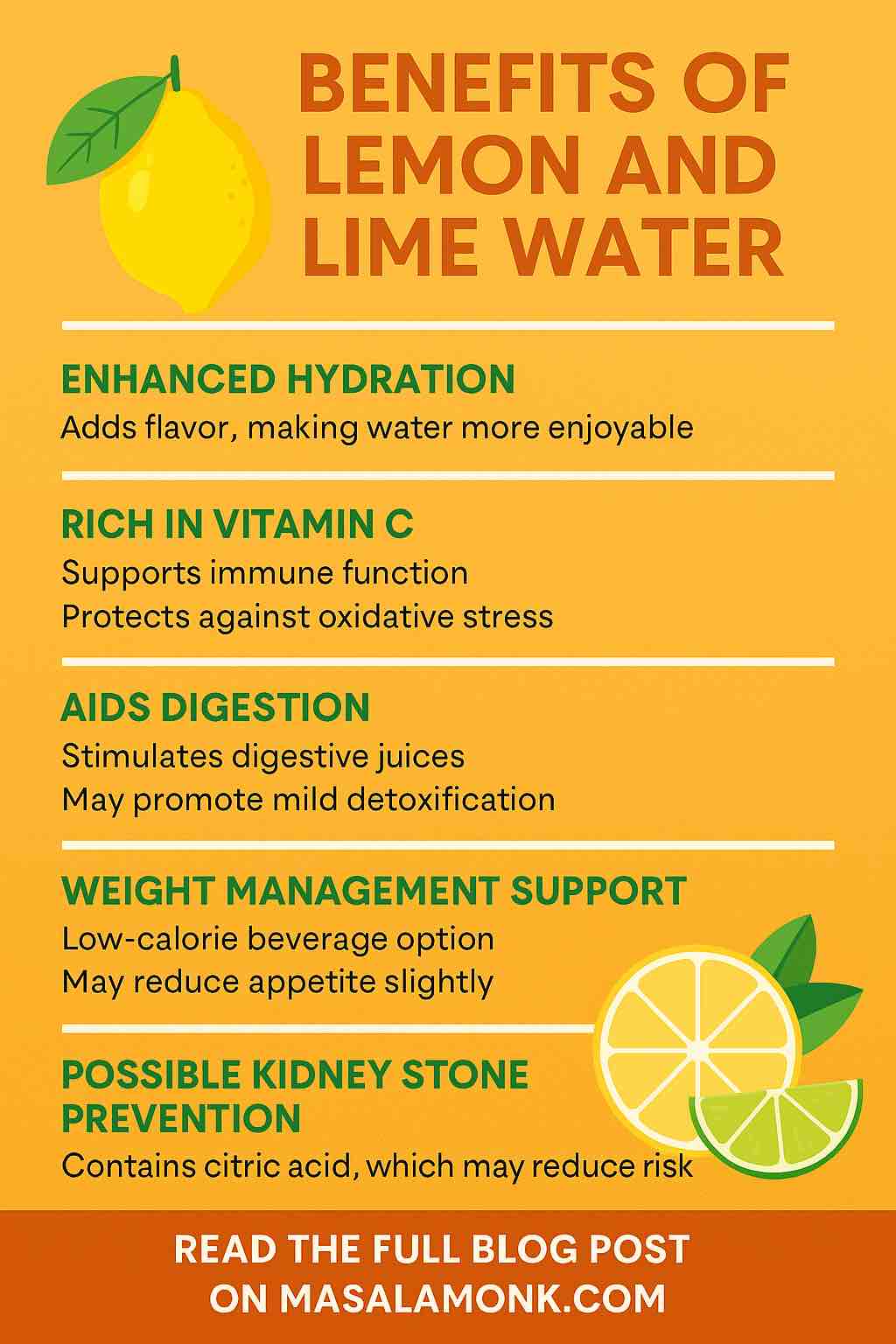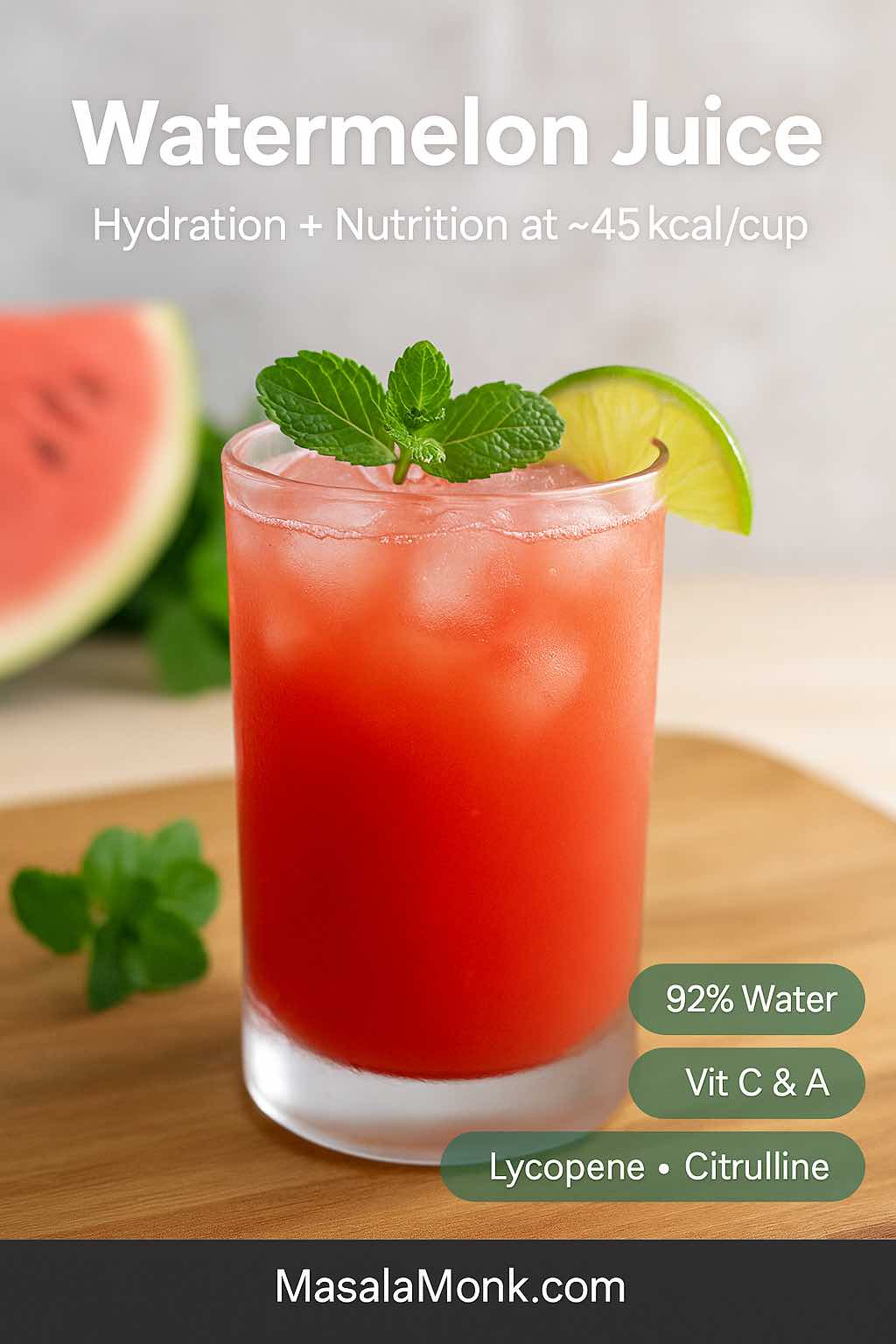
When the summer sun beats down and you’re craving something that’s refreshing yet genuinely nourishing, few drinks feel as right as a tall glass of watermelon juice. Sweet and cooling with that ruby glow, it’s more than a seasonal indulgence. Watermelon juice delivers hydration, vitamins, minerals, and antioxidants in a form your body recognizes and loves. If you’ve wondered, “What are the benefits of watermelon juice—and is watermelon juice good for health?” this guide puts everything in one place: the nutrition, the daily uses, the gender-specific advantages, and the side effects you should know before making it a habit.
Watermelon has always had a practical role in hot climates. Traditionally, people turned to it to quench thirst, calm digestion, and revive tired muscles after fieldwork. Today, modern nutrition explains why that wisdom works: watermelon juice combines a very high water content with vitamin C, vitamin A (as beta-carotene), small amounts of B-vitamins, potassium and magnesium, plus two star compounds—lycopene and citrulline—that support circulation, recovery, and long-term wellness. That’s the head start. Now let’s translate it into everyday benefits you can actually feel.
Nutritional Benefits of Watermelon Juice
The real magic of watermelon juice begins with its impressive nutritional profile. While it may seem like a simple, water-rich fruit, each glass is loaded with compounds that nourish your body from the inside out. At breakfast, between meetings, after a walk in the heat—whenever the body whispers for fluids—this is a quick, easy yes. Here’s what makes it such a valuable drink:
Low in Calories, High in Hydration
One cup (about 240 ml) of fresh watermelon juice contains just 45 calories — far fewer than most packaged juices or sodas. At the same time, it’s made up of over 90% water, making it one of the best natural drinks for hydration. This is why many people choose it as a lighter alternative to energy drinks or sugary beverages. (MyFoodData)
Packed with Vitamins
Beyond the water, the vitamin C content is a quiet overachiever. In just one cup you cover over a fifth of your daily needs, enough to support immune function and help your skin look brighter. Vitamin A (from beta-carotene) works alongside it, aiding skin renewal and eye health. You also get a touch of vitamin B6, useful for energy metabolism and a steady mood.
- Vitamin C: One cup provides more than 20% of your daily needs, supporting your immune system and helping your skin stay radiant.
- Vitamin A (beta-carotene): Promotes healthy eyes and glowing skin.
- Vitamin B6: Helps with energy metabolism and brain function.
These vitamins make the health benefits of drinking watermelon juice especially attractive if you want a natural way to support immunity and skin health.
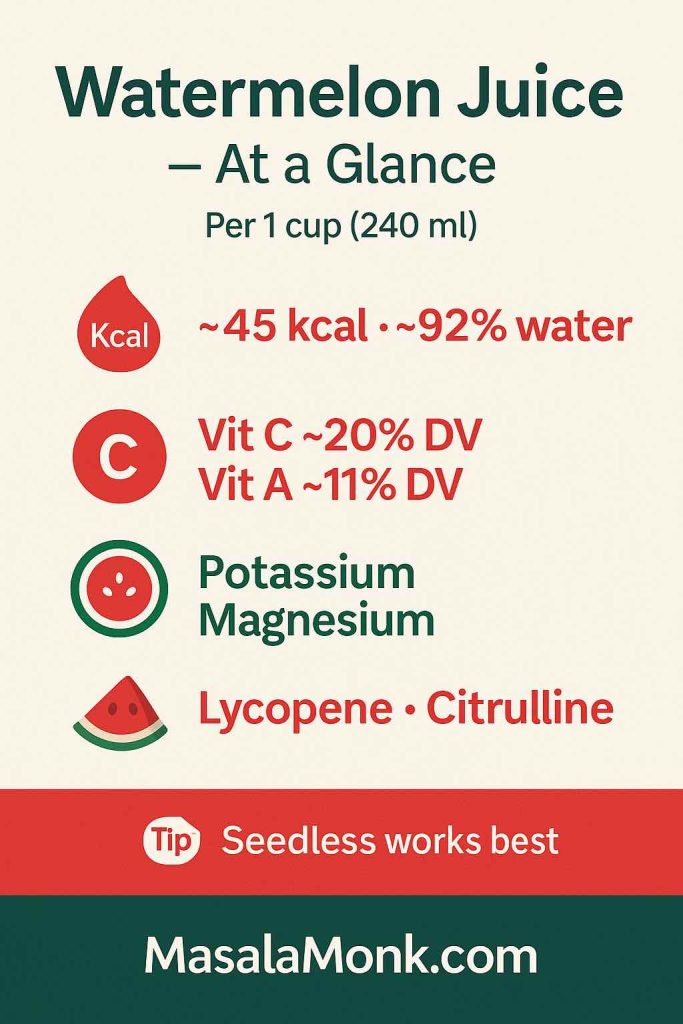
Rich in Minerals
Minerals round out the picture. Potassium helps maintain normal blood pressure and healthy muscle function, while magnesium supports nerves, recovery, and a calmer, steadier energy. These aren’t massive doses—but they add up, especially if you’re swapping watermelon juice for sugary sodas or heavy packaged juices.
- Potassium: Regulates blood pressure and supports muscle function.
- Magnesium: Important for nerve health, muscle recovery, and maintaining energy levels.
Because of these minerals, the advantages of watermelon juice go beyond hydration — it actually supports your heart and muscles, too.
Antioxidants That Heal and Protect
Then come the two heavy hitters. Lycopene, the red carotenoid that gives watermelon its color, is associated with a healthier heart and lower oxidative stress—think of it as part of your internal “rust protection.” Citrulline, a naturally occurring amino acid, is converted in the body to arginine and then to nitric oxide, which helps relax blood vessels and improve blood flow. For you, that often shows up as better circulation and less post-exercise soreness.
- Lycopene: A carotenoid that gives watermelon its red color and is linked to heart health and reduced inflammation. Studies also suggest lycopene may play a role in protecting against certain cancers.
- Citrulline: An amino acid that improves blood circulation and helps reduce muscle soreness after exercise.
These compounds give watermelon juice an edge over other fruit juices, especially for those interested in fitness, recovery, and long-term wellness.
A Quick Nutrition Snapshot (per 1 cup / 240 ml):
- Calories: ~45
- Water: ~92%
- Vitamin A: 11% DV
- Vitamin C: 21% DV
- Vitamin B6: 5% DV
- Potassium: 4% DV
- Magnesium: 4% DV
- Lycopene: ~6,500 mcg
- Citrulline: 200–300 mg
This simple breakdown highlights why so many nutritionists recommend watermelon juice as part of a balanced diet. It’s light, nutrient-dense, and deeply hydrating — all the qualities you want in a natural health drink.
Read more about The Watermelon – Nutrition, Benefits, and 5 Practical Ways for Weight Loss.
From Nutrition to Daily Life
Knowing the nutrients is one thing, but understanding how they actually translate into real-world benefits is even more important. Whether you’re someone who works long hours outdoors, a gym enthusiast, or simply looking for a healthier drink to enjoy with meals, the uses of watermelon juice go far beyond quenching thirst.
In the next section, we’ll dive into the top health benefits of drinking watermelon juice, and explore how this sweet red fruit can boost your energy, support your heart, keep your skin radiant, and much more.
Top Health Benefits of Drinking Watermelon Juice
Now that we’ve seen just how nutrient-rich this fruit is, let’s talk about what it actually does for your body. The health benefits of watermelon juice are backed not just by tradition, but also by science. From keeping you hydrated to helping your muscles recover, here’s why this refreshing drink deserves a regular spot in your diet.
1. Boosts Hydration Naturally
One of the most obvious — and most powerful — benefits of watermelon juice is hydration. With more than 90% water content, it works almost like nature’s own sports drink. Unlike plain water, watermelon juice also contains potassium, magnesium, and natural sugars that help replenish electrolytes lost through sweat.
Because watermelon juice carries electrolytes along with water—particularly potassium and magnesium—it does more than slosh through the system. On a still, heavy afternoon, a chilled glass can lift that dull fatigue far better than a can of cola. After a sweaty commute or a quick run, it restores fluid balance without a synthetic aftertaste.
2. Supports Heart Health
Heart disease is one of the leading health concerns worldwide, and diet plays a huge role in prevention. The advantages of watermelon juice for cardiovascular health come mainly from lycopene and citrulline.
- Lycopene, the antioxidant responsible for watermelon’s red color, has been linked to lower cholesterol levels and reduced oxidative stress — both key factors in heart health.
- Citrulline helps relax blood vessels and improves circulation, which can reduce blood pressure levels over time.
- Potassium supports healthy heart rhythms and prevents excess fluid retention. (American Heart Association)
Lycopene helps counter day-to-day oxidative stress, while citrulline supports the nitric-oxide pathway that relaxes blood vessels. Add in potassium’s role in fluid balance and healthy heart rhythm, and you have a gentle, food-first way to look after your cardiovascular system. It’s not a substitute for medication or lifestyle changes, of course, but as a daily habit alongside movement and a balanced plate, it’s smart.
3. Aids Digestion and Eases Bloating
Another lesser-known benefit of drinking watermelon juice daily is how gentle it is on digestion. While the juice itself is low in fiber, its high water content helps soften stools and keep the digestive system moving smoothly.
If you ever feel bloated after heavy or salty meals, watermelon juice can help. Its natural diuretic effect encourages your body to flush out excess water and sodium, reducing puffiness and discomfort. This makes it especially useful for people prone to water retention.
4. Improves Skin and Hair Health
Looking for a natural beauty booster? One of the sweetest health benefits of watermelon juice is how it nourishes your skin and hair from the inside out.
- Vitamin C stimulates collagen production, which keeps skin firm and youthful.
- Vitamin A helps repair skin cells and prevent dryness.
- Hydration keeps your skin plump and glowing.
- Antioxidants reduce oxidative stress, slowing down premature aging.
Many women swear by a glass of watermelon juice in their morning routine for that extra glow. Men also benefit — hydration and circulation improvements can reduce dullness and dryness caused by long days outdoors.
Hydration softens edges—tiredness shows less on your face; skin looks smoother. Vitamin C supports collagen formation; vitamin A helps with cell turnover; antioxidants mop up some of the stress your skin battles daily. The change isn’t dramatic overnight, but after a few weeks of consistent intake, many people notice a quiet, healthy glow.
5. Helps Muscle Recovery and Energy
If you’ve ever hit the gym hard or spent a long day doing physical work, you’ll know the pain of sore muscles. Here’s where watermelon juice really shines.
Thanks to citrulline, one of the key amino acids in watermelon, the juice has been shown to reduce muscle soreness and speed up recovery after workouts. Small human trials even suggest that athletes who drink watermelon juice before or after training report less fatigue, quicker rebound times, and less next-day muscle soreness. (J. Agric. Food Chem. – 2013)
Pair this with its natural sugars and minerals, and you’ve got a post-exercise drink that hydrates, energizes, and helps your body bounce back — no need for synthetic sports drinks. Find 5 Ways to Incorporate Watermelon into Your Summer Fitness Routine: Stay Refreshed and Reap the Benefits.
6. Boosts Immunity and Fights Inflammation
Beyond hydration and recovery, the nutritional benefits of watermelon juice extend to your immune system. Vitamin C, lycopene, and other antioxidants fight free radicals that can weaken immunity and contribute to chronic inflammation.
Regularly drinking watermelon juice may help your body fend off minor infections, speed up healing, and protect against long-term health risks caused by inflammation.
Putting the Benefits of Watermelon Juice Into Perspective
When you think about it, these benefits of watermelon juice aren’t isolated perks. They connect to everyday life:
- Quenching your thirst on hot days.
- Giving your heart and muscles the nutrients they need.
- Supporting skin health for a natural glow.
- Helping your body recover from stress or exercise.
That’s why so many people are turning to watermelon juice as a daily habit, not just a seasonal treat. And speaking of daily habits — let’s look closer at what happens when you make this juice a regular part of your routine.
Benefits of Drinking Watermelon Juice Daily
We’ve all heard the saying, “Consistency is key,” and when it comes to health, this couldn’t be more true. While an occasional glass of watermelon juice is refreshing, making it a part of your daily routine unlocks even greater rewards. Let’s explore the benefits of drinking watermelon juice daily and why it could be one of the easiest healthy habits to adopt.
A Morning Hydration Boost
After hours of sleep, your body wakes up slightly dehydrated. Instead of reaching immediately for coffee or tea, try starting your day with a small glass of fresh watermelon juice – maybe with a squeeze of lime. Its high water content rehydrates your body gently, while natural sugars and vitamins give you a light energy boost. You feel more alert without the jitter.
This habit not only makes mornings feel fresher but also ensures that your digestive system kicks into gear smoothly. Many people find that this practice reduces sluggishness and sets the tone for a more energized day.
Natural Support for Weight Management
If weight management is on your radar, this is a friendly ally. At ~45 calories per cup, it soothes a sweet tooth and heads off snack-ish impulses. Swap a mid-afternoon pastry for a chilled glass and watch the difference over a month. It’s not a trick; it’s simply easier to choose better when you’re hydrated and satisfied. For deeper tips, see our guide to watermelon for weight management (Nutrition + 5 Practical Ways).
One of the biggest advantages of watermelon juice for daily consumption is its role in weight control. Since it’s low in calories yet naturally sweet, it can replace sugary drinks without leaving you feeling deprived. Sipping a glass mid-morning or mid-afternoon can curb cravings and keep you from reaching for packaged snacks and other junk food.
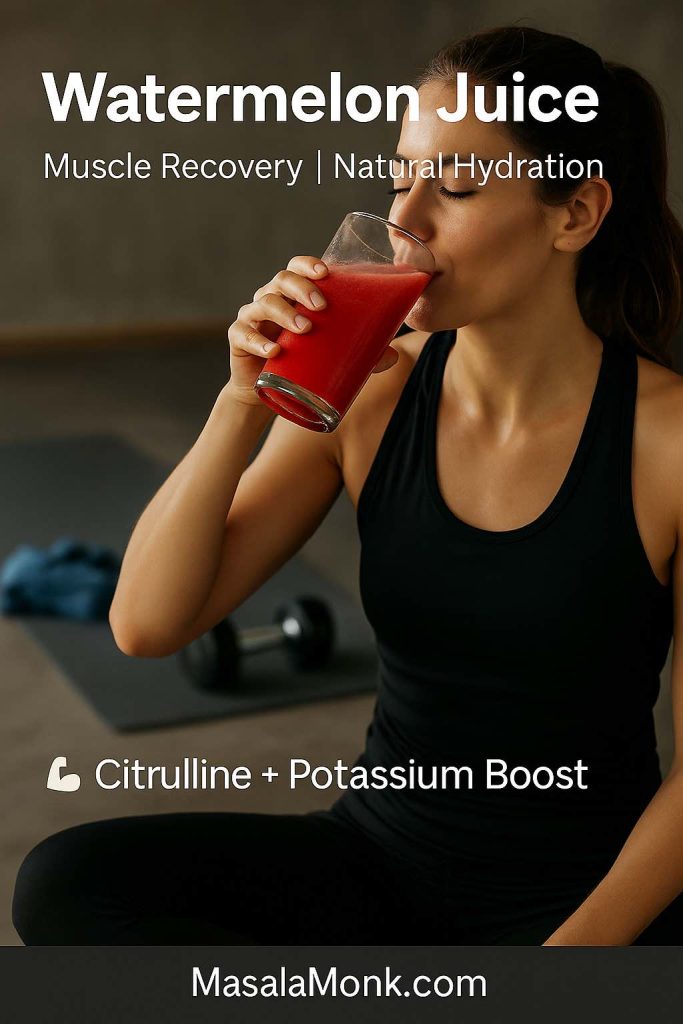
Better Post-Workout Recovery
If you exercise regularly, watermelon juice makes an excellent daily recovery drink. Its citrulline content reduces soreness, while potassium and magnesium help muscles relax and replenish. Drinking it after workouts can help your body bounce back faster, so you’re ready for the next session. (Tarazona-Díaz 2013. PubMed)
A Gentle Detox for Your Body
Thanks to its water and antioxidant content, watermelon juice acts as a natural detoxifier. Daily intake encourages your body to flush out toxins, reduce bloating, and maintain smoother digestion. Unlike harsh detox fads, this is a gentle, sustainable way to support your system.
Is Watermelon Juice Good on an Empty Stomach?
This is one of the most common questions people ask: “Can I drink watermelon juice on an empty stomach?” The answer is yes — and in many cases, it’s actually one of the best times to enjoy it.
Why It Works in the Morning
Drinking watermelon juice first thing in the morning hydrates your body after a night’s rest, delivers vitamins quickly, and provides a refreshing start without being too heavy. It’s especially beneficial in hot weather, when your body is prone to losing fluids quickly.
Things to Keep in Mind
However, moderation is important. For most people, a small to medium glass is ideal. Since watermelon juice contains natural sugars, consuming it in very large quantities on an empty stomach might cause a temporary spike in blood sugar. If you’re diabetic, insulin-resistant, managing blood sugar or tend to feel woozy with fruit first thing, simply pair your juice with a light breakfast—yogurt, eggs, a handful of nuts. You’ll still enjoy the benefits of watermelon juice on an empty stomach, but with a softer impact on glucose. (Harvard Health – GI vs GL)
Practical Tip
Try blending watermelon juice with a squeeze of lime in the morning. The lime adds a zesty twist and extra vitamin C, making the drink even more refreshing and digestion-friendly.
Daily Uses of Watermelon Juice
Think beyond “juice with breakfast.” Keep a bottle in the fridge and use it like a tool. A small glass before you head into the sun; a glass when the 4 p.m. slump hits; a splash at dinner instead of soda. Kids usually adore it (the color helps), and older family members—who are more vulnerable to dehydration—find it easier to sip regularly when it tastes this good. Fold it into your day wherever hydration would make the next hour better. Beyond mornings and workouts, there are many practical uses of watermelon juice in daily life:
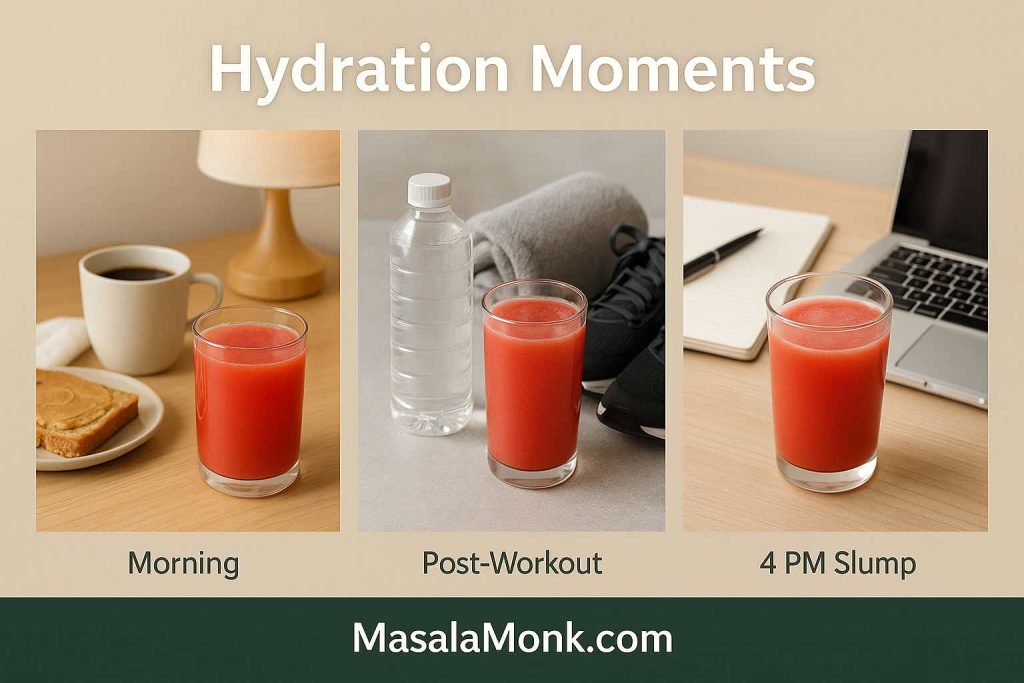
- As a mid-day refresher: Keeps you hydrated when energy levels dip.
- As a mealtime drink: A healthier alternative to sodas or artificially flavored juices.
- As a family-friendly beverage: Kids love the natural sweetness, and it’s a safer option than sugary store-bought drinks.
- As a skin-friendly routine: Regular intake provides hydration and nutrients that show up in your skin over time.
These everyday uses highlight why so many people now see watermelon juice not just as a seasonal treat, but as a daily health practice.
Moving on
So, whether you sip it first thing in the morning, after your workout, or simply as a refreshing break during the day, the benefits of drinking watermelon juice daily are undeniable. But daily routines can look different for everyone — which is why it’s helpful to also explore how watermelon juice may specifically support women and men in unique ways.
Watermelon Juice Benefits for Women
For many women, the advantages of watermelon juice show up as steadier energy and bloating relief during hormonal shifts. That mild diuretic effect can ease water retention, and the vitamin C + A combo is great for glow. Because it’s low in calories but naturally sweet, it also makes weight-management choices feel less punitive. If your routine includes yoga, runs, or strength classes, the potassium and magnesium help guard against cramps, and citrulline supports endurance and recovery—quietly, in the background, the way the best habits do.
Skin Glow and Anti-Aging Support
One of the biggest advantages of watermelon juice for women is its impact on skin. The mix of vitamin C, vitamin A, and lycopene works together to promote collagen production, reduce oxidative stress, and fight the early signs of aging. Women who drink watermelon juice regularly often notice healthier, more radiant skin without relying solely on expensive skincare products.
Know more about its benefits for skin and explore some exciting recipe in: Watermelon: The Hydration Hero for Your Skin – Benefits, Myths, and 5 Quenching Recipes for Dewy Skin

Weight Management and Craving Control
Women juggling work, family, and self-care often struggle with snacking or sugary cravings. Watermelon juice provides natural sweetness without excess calories — just around 45 per cup. It’s filling, hydrating, and a much better alternative to sodas or packaged juices. Making it a daily ritual can help support weight management goals.
Relief from Bloating and Water Retention
Hormonal changes during menstrual cycles can sometimes cause bloating and puffiness. Because watermelon juice has mild diuretic properties, it helps the body release excess sodium and water, bringing a sense of lightness and comfort.
Nutrient Boost for Active Lifestyles
For active women — whether in fitness, yoga, or simply balancing busy days — watermelon juice provides potassium and magnesium that prevent fatigue and muscle cramps. The citrulline content also helps with endurance and recovery.
Watermelon Juice Benefits for Men
Men often notice the benefits of drinking watermelon juice daily in performance and recovery. Better circulation (that citrulline-to-nitric-oxide pathway again) can translate to improved stamina; the electrolyte + water mix reduces post-workout drag. For men working long hours in the heat or on physically demanding sites, it’s a practical hydration choice—quick relief without the syrupy sugar load of many “sports” drinks. Over the long run, antioxidants like lycopene matter for heart and prostate wellness; they’re not a cure-all, but they’re a wise daily bet. (Bailey 2016. PubMed)
Improved Circulation and Stamina
The amino acid citrulline found in watermelon juice supports nitric oxide production in the body, which helps relax blood vessels and improve circulation. This is not only beneficial for heart health but can also enhance stamina and physical performance.
Faster Post-Workout Recovery
Men who lift weights, run, or engage in sports can benefit from watermelon juice as a natural recovery drink. Citrulline reduces muscle soreness, while potassium helps prevent cramps. Its combination of hydration and antioxidants makes it one of the best post-training beverages.
Hydration for Outdoor and Active Jobs
For men working outdoors or in physically demanding roles, dehydration is a constant challenge. Watermelon juice provides quick relief by restoring fluids, electrolytes, and energy at the same time. It’s a practical choice for construction workers, athletes, or anyone exposed to long hours in the sun.
Heart and Prostate Support
Antioxidants like lycopene in watermelon juice are particularly important for men, as they have been linked to cardiovascular wellness and prostate health. Regular intake can support long-term vitality. (Vincellette 2021. PMC)
Is Watermelon Juice Good for Hydration?
If there’s one thing watermelon juice is famous for, it’s hydration. With over 90% water, plus a good balance of natural sugars and electrolytes, it’s one of the best drinks to keep your body refreshed. It won’t replace plain water, but it’s a superb companion—particularly when you’re sweating. Compared with water alone, watermelon juice offers quick energy and electrolytes; compared with many sports drinks, it offers the same hydration logic without loud colors or artificial flavors. It’s also family-friendly: children who resist plain water usually don’t resist watermelon. But let’s break down why the hydration benefits of watermelon juice go beyond plain water.
Better Than Plain Water in Some Cases
While nothing replaces clean drinking water, watermelon juice offers added perks. The natural sugars give you quick energy, while potassium and magnesium replenish electrolytes lost through sweat. This makes it especially useful on hot summer days, after workouts, or anytime you’re prone to dehydration.
How It Compares to Sports Drinks
Many sports drinks claim to restore electrolytes, but they often come loaded with artificial flavors, added sugars, or preservatives. A glass of fresh watermelon juice does the same job naturally, without any chemicals. If you’ve ever felt dizzy or drained after a run or yoga session, sipping watermelon juice can help restore balance quickly.
Hydration for All Ages
The advantages of watermelon juice for hydration aren’t limited to adults. Kids who refuse plain water often love the sweet taste of watermelon juice, making it an easy way to keep them hydrated during playtime. Seniors also benefit, since dehydration risk increases with age.
Side Effects of Drinking Too Much Watermelon Juice
Like most good things, watermelon juice works best in moderation. Every healthy habit has a sensible range. With watermelon juice, the sweet spot for most adults is 1–2 cups a day, ideally earlier in the day. While the health benefits of watermelon juice are undeniable, drinking too much can cause some discomfort. Here are a few possible side effects of watermelon juice to keep in mind:
Excess Sugar Intake
Even though it’s natural sugar, watermelon is still sweet. Drinking large amounts of watermelon juice daily may raise blood sugar levels — something diabetics need to monitor carefully.
Digestive Upset
Because watermelon is rich in water and has mild diuretic properties, overconsumption can lead to bloating, loose stools, or frequent trips to the bathroom.
Night-Time Discomfort
Many people enjoy a chilled glass of watermelon juice at night, but its diuretic effect can disrupt sleep with multiple bathroom breaks. It’s better to enjoy it earlier in the day.
Allergic Reactions (Rare)
While uncommon, some people may be sensitive to watermelon. If you experience itching, swelling, or discomfort after drinking it, consult a doctor.
Balancing Benefits and Precautions
When consumed in moderation — one to two cups a day for most healthy adults — the advantages of watermelon juice far outweigh the side effects. The key is to enjoy it as part of a varied diet, not as a replacement for other fruits, vegetables, or balanced meals.
What Does Watermelon Juice Do for the Body?
At this point, you might be asking: “Okay, but in simple terms, what are the real effects of watermelon juice on the body?” The short answer is — it hydrates, nourishes, and protects. The long answer is where things get exciting.
- Hydration & Energy: Watermelon juice replenishes fluids faster than plain water, thanks to its balance of natural sugars and electrolytes. This makes you feel more alert and energized.
- Heart & Circulation: Lycopene and citrulline in watermelon juice improve blood flow and support cardiovascular health.
- Immunity & Repair: Vitamins A and C boost your body’s ability to fight infections and heal tissues.
- Skin & Hair: Regular intake contributes to brighter, healthier-looking skin and stronger hair.
- Muscle Support: For anyone active, citrulline helps muscles recover faster and reduces soreness.
So, in practical terms, the effects of watermelon juice can be felt in how hydrated you feel, how quickly you recover after activity, and even how your skin glows after a few weeks of making it a habit.
How to Make Fresh Watermelon Juice at Home
One of the biggest advantages of watermelon juice is how easy it is to make. Unlike complicated juices that need multiple ingredients, watermelon juice requires almost no effort.
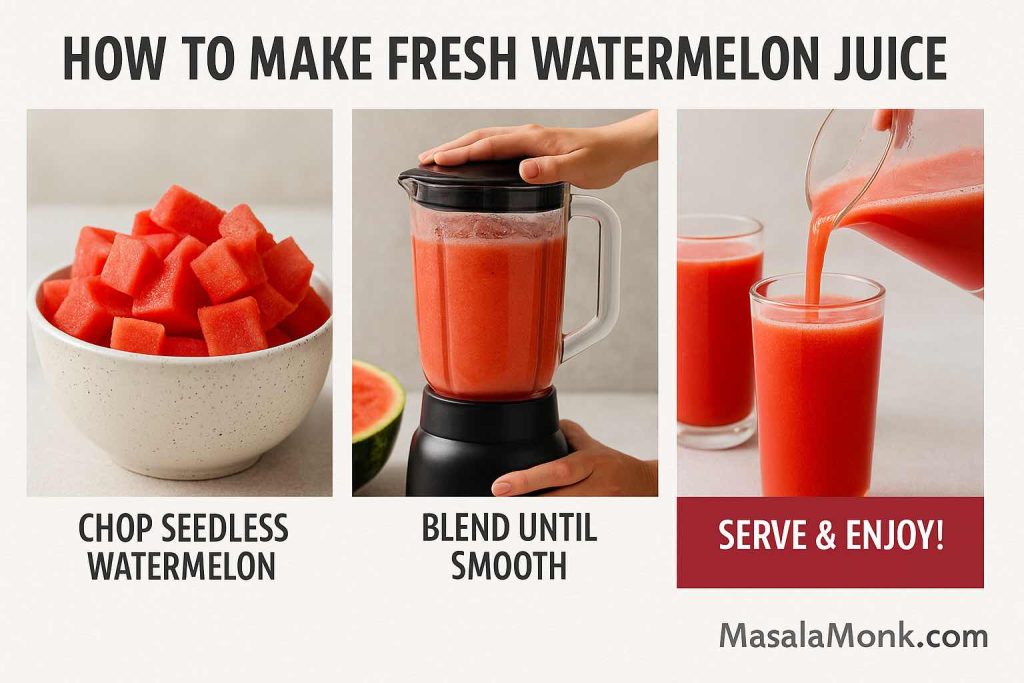
Basic Fresh Watermelon Juice Recipe
Keep it simple. Add 2–3 cups of chilled, seedless watermelon cubes to a blender and blend until smooth. Strain if you prefer a silkier texture, or keep the pulp for body. Serve very cold.
- Take 2–3 cups of chilled watermelon cubes (seedless if possible).
- Blend until smooth.
- Strain if you prefer a thinner texture, though many enjoy it pulpy.
- Serve chilled.
That’s it — fresh, pure, and naturally sweet. This simple version already gives you all the nutritional benefits of watermelon juice without additives or preservatives.
Delicious Variations of Watermelon Juice
While pure watermelon juice is delightful on its own, you can easily upgrade it with a few simple ingredients to add flavor, enhance nutrition, or create variety in your daily routine.
If you enjoy variations, try a squeeze of lime (zesty, digestion-friendly), a handful of mint (cooling, bloating-relief), or a half-cup of cucumber (ultra-hydrating). For heavy-sweat days, blend with coconut water for a natural electrolyte boost. Need an iron-leaning, stamina-friendly version? Add a small beetroot chunk and a sliver of ginger. Prefer a picnic pitcher? Stir in lemon and a touch of honey for a bright watermelon lemonade that still feels grown-up.
Watermelon Lime Juice
Adding a splash of lime juice enhances flavor, boosts vitamin C, and aids digestion. It’s one of the most popular uses of watermelon juice in tropical regions.
Watermelon Mint Juice
A handful of fresh mint leaves blended with watermelon juice turns it into a refreshing cooler. Mint also aids digestion and reduces bloating. To explore more, have a look at 5 Fun and Refreshing Watermelon Mocktails for Summer Celebrations.
Watermelon Cucumber Juice
Perfect for summer detoxing, cucumber adds even more hydration and minerals. This combination is cooling, light, and excellent after workouts or yoga. Infact this one words very well with Mint as well, find it in Optimize Digestion with These 5 Fruit Juice Recipes.
Watermelon Coconut Water Drink
Blend watermelon with fresh coconut water for an electrolyte-packed energy drink. It’s a natural alternative to sports drinks, loved by athletes. Read more about Coconut and its precious water in our The Ultimate Guide to Coconut Water: Benefits, Nutrition, and How to Choose the Best One.
Watermelon Beetroot Juice
Adding beetroot enhances iron content and boosts stamina. Some people also mix in a touch of ginger for digestion and an immunity boost.
Watermelon Lemonade
For a tangy twist, combine watermelon juice with lemon and a touch of honey. It makes a great family-friendly drink and is a healthier alternative to packaged lemonades.
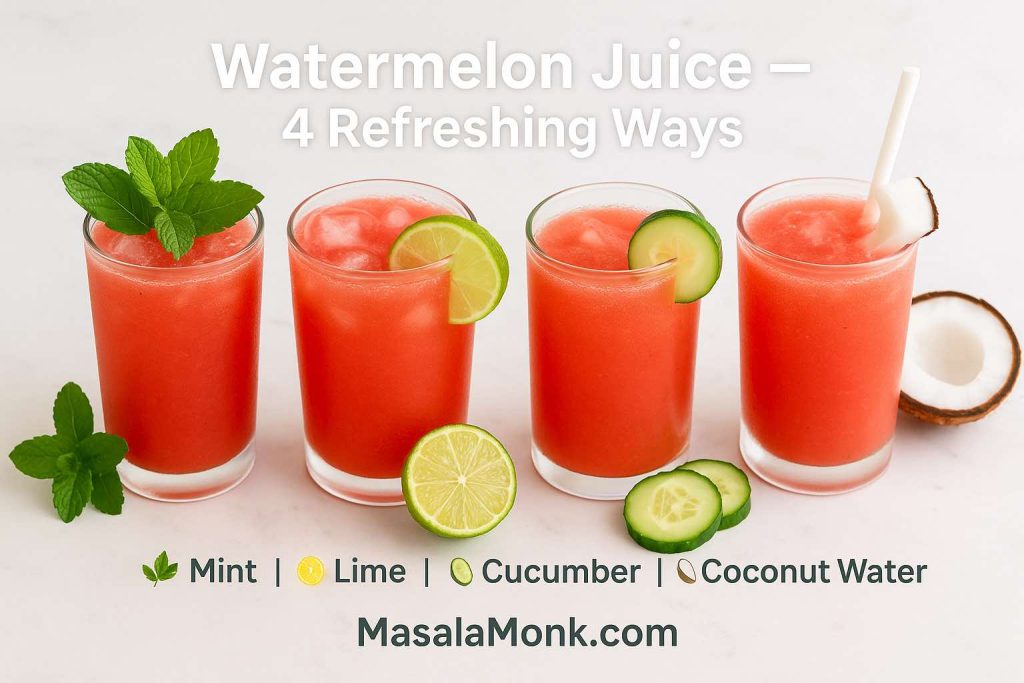
Why Fresh Watermelon Juice Is Best
While bottled juices are convenient, nothing beats the benefits of drinking fresh watermelon juice. Store-bought options may contain added sugar, preservatives, or concentrate that reduce nutritional value. Fresh juice, on the other hand, retains all the vitamins, antioxidants, and natural enzymes that your body thrives on.
If you’re short on time and buying, pick cold-pressed bottles labeled “100% watermelon juice” and “no added sugar.” The taste should be clean and the ingredient list short enough to memorize.
Conclusion
Refreshing, nutrient-rich, and incredibly versatile, watermelon juice is more than just a seasonal drink — it’s a natural health tonic you can enjoy year-round. From keeping you hydrated on hot days to supporting your heart, skin, and muscles, the benefits of watermelon juice are backed by both tradition and modern nutrition science.
Drinking it daily in moderation — whether first thing in the morning, after a workout, or as a mid-day refresher — can make a noticeable difference in your energy, digestion, and overall wellness. And with so many delicious variations, from lime and mint blends to cucumber and coconut water combinations, there’s no shortage of ways to keep things exciting.
At the same time, it’s important to remember that moderation matters. While the advantages of watermelon juice are many, drinking it in very large quantities can cause discomfort for some people. Think of it as part of a balanced lifestyle: one to two cups daily is usually perfect for most adults.
So, the next time you’re craving something that quenches thirst and nourishes the body, skip the packaged sodas and juices — and pour yourself a glass of fresh, homemade watermelon juice instead. Your body (and taste buds) will thank you.
Frequently Asked Questions About Watermelon Juice
What are the main benefits of watermelon juice?
The health benefits of watermelon juice include hydration, improved heart health, muscle recovery, better digestion, glowing skin, and stronger immunity. It’s also low in calories and naturally sweet, making it a healthier alternative to packaged drinks.
Is watermelon juice good for health?
Yes, watermelon juice is considered very healthy when consumed in moderation. It contains vitamins A, C, and B6, minerals like potassium and magnesium, and antioxidants such as lycopene and citrulline that support circulation, skin, and immunity.
Can I drink watermelon juice daily?
Absolutely. Drinking one to two cups of fresh watermelon juice daily can help with hydration, energy, and nutrient intake. Just avoid overconsumption, especially if you have diabetes, as it contains natural sugars.
Is watermelon juice good on an empty stomach?
Yes, drinking watermelon juice on an empty stomach — especially in the morning — is a great way to rehydrate after sleep and kickstart digestion. However, if you’re sensitive to natural sugars or prone to blood sugar spikes, pair it with a light breakfast.
Is watermelon juice good for hydration?
Yes. With over 90% water content, plus electrolytes like potassium and magnesium, watermelon juice is one of the best natural hydration drinks. It’s especially effective after workouts, in hot weather, or during long days outdoors.
What are the side effects of drinking too much watermelon juice?
Overconsumption may cause bloating, digestive upset, or frequent urination due to its diuretic effect. It can also raise blood sugar if consumed in large quantities, so people with diabetes should be cautious.
What does watermelon juice do for the body?
Watermelon juice hydrates the body, supports heart and muscle health, nourishes skin, and boosts immunity. Its nutrients and antioxidants provide energy and help reduce inflammation.
Is fresh watermelon juice better than bottled?
Yes. Fresh watermelon juice benefits are greater because it contains no added sugars or preservatives, and all vitamins, minerals, and antioxidants remain intact. Bottled or processed versions often lose nutrients during production.
What are the benefits of watermelon juice for women?
Women benefit from improved skin health, hydration, weight management support, and reduced bloating during hormonal cycles. Regular intake can also enhance energy levels and reduce fatigue.
What are the benefits of watermelon juice for men?
For men, the advantages of watermelon juice include faster muscle recovery, better circulation and stamina, hydration during physically demanding work, and antioxidants like lycopene that support prostate and heart health.

